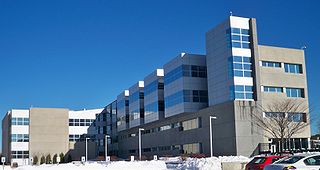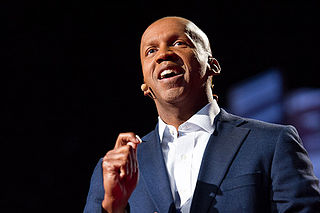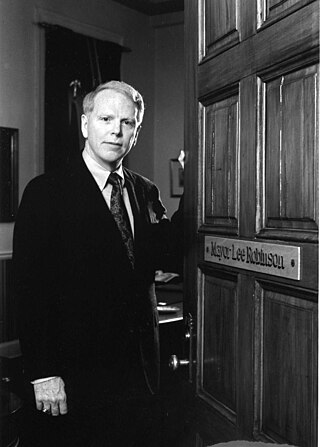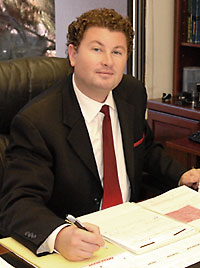Related Research Articles
Gideon v. Wainwright, 372 U.S. 335 (1963), was a landmark U.S. Supreme Court decision in which the Court ruled that the Sixth Amendment of the U.S. Constitution requires U.S. states to provide attorneys to criminal defendants who are unable to afford their own. The case extended the right to counsel, which had been found under the Fifth and Sixth Amendments to impose requirements on the federal government, by imposing those requirements upon the states as well.
A public defender is a lawyer appointed to represent people who otherwise cannot reasonably afford to hire a lawyer to defend themselves in a trial. Several countries provide people with public defenders, including the UK, Belgium, Hungary and Singapore, and some states of Australia. Brazil is the only country in which an office of government-paid lawyers with the specific purpose of providing full legal assistance and representation to the needy free of charge is established in the constitution. The Sixth Amendment to the US Constitution, as interpreted by the Supreme Court, requires the US government to provide legal counsel to indigent defendants in criminal cases. Public defenders in the United States are lawyers employed by or under contract with county, state or federal governments.

Bruce Robert Jacob is a former Assistant Attorney General for the State of Florida during the early 1960s. He represented Louie L. Wainwright, the Director of the Florida Division of Corrections, in the Supreme Court case of Gideon v. Wainwright, decided in March 1963, regarding the right to counsel of indigent defendants in non-capital felony cases in state courts. The attorney representing the Petitioner, Clarence Gideon, was Abe Fortas, a Washington, D.C. lawyer who later became a Justice of the Supreme Court. The previous 1942 Supreme Court case of Betts v. Brady required the appointment of counsel for an indigent defendant at state expense if there was a “special circumstance” present in the case which made it necessary for counsel to be provided for the defendant to receive a fair trial. For example, if the defendant was indigent and was extremely young, or lacked education or experience, was unfamiliar with court procedures, or if the charges against him were complex, the trial court was required under the Due Process Clause of the Fourteenth Amendment to appoint counsel. Jacob argued against any extension of the defendant's right to counsel. The Court in Gideon overruled Betts and required state courts to appoint attorneys for defendants in all felony prosecutions.

Touro University Jacob D. Fuchsberg Law Center, commonly known as Touro Law Center, is an ABA accredited law school. It is located on Long Island, New York, in the hamlet of Central Islip. The Law Center is part of Touro University, a private, not-for-profit, coeducational institution based in New York City.
In criminal law, the right to counsel means a defendant has a legal right to have the assistance of counsel and, if the defendant cannot afford a lawyer, requires that the government appoint one or pay the defendant's legal expenses. The right to counsel is generally regarded as a constituent of the right to a fair trial. Historically, however, not all countries have always recognized the right to counsel. The right is often included in national constitutions. Of the 194 constitutions currently in force, 153 have language to this effect.

Bryan Stevenson is an American lawyer, social justice activist, law professor at New York University School of Law, and the founder and executive director of the Equal Justice Initiative. Based in Montgomery, Alabama, he has challenged bias against the poor and minorities in the criminal justice system, especially children. He has helped achieve United States Supreme Court decisions that prohibit sentencing children under 18 to death or to life imprisonment without parole. He has assisted in cases that have saved dozens of prisoners from the death penalty, advocated for the poor, and developed community-based reform litigation aimed at improving the administration of criminal justice.

William Lee Robinson was an American politician who was the Mayor of Macon, Georgia from 1987–1991, and a four-term State Senator of Georgia. At the time of his death, Lee Robinson was serving as the Circuit Public Defender of the Macon (Georgia) Judicial Circuit, which includes Bibb, Peach and Crawford Counties.
Legal aid in the United States is the provision of assistance to people who are unable to afford legal representation and access to the court system in the United States. In the US, legal aid provisions are different for criminal law and civil law. Criminal legal aid with legal representation is guaranteed to defendants under criminal prosecution who cannot afford to hire an attorney. Civil legal aid is not guaranteed under federal law, but is provided by a variety of public interest law firms and community legal clinics for free or at reduced cost. Other forms of civil legal aid are available through federally-funded legal services, pro bono lawyers, and private volunteers.

Jason Scott "Jay" Leiderman was an American criminal defense lawyer based in Ventura, California. The Atlantic Magazine called Leiderman the "Hacktivist's Advocate" for his work defending hacker-activists accused of computer crimes, or so-called "Hacktivism" especially people associated with Anonymous. BuzzFeed called Leiderman "The Maserati-Driving Deadhead Lawyer Who Stands Between Hackers And Prison" and stated he was "A medical marijuana and criminal defense lawyer from Southern California [who] has made himself into the country's leading defender of hackers."
The Bronx Defenders is a public defender office located in the South Bronx neighborhood of New York City. At the Bronx Defenders, criminal defense lawyers work together with civil lawyers, family defense lawyers, immigration lawyers, non-attorney advocates, social workers, and investigators to help their clients address the full range of legal and social issues that can result from criminal charges.
Gideon's Promise, formerly the Southern Public Defender Training Center, is a non-profit organization founded in 2007 with a fellowship from George Soros’ Open Society Foundation. The organization is based in Atlanta, Georgia, and provides ongoing continuing education programs for law school students, new public defenders, senior public defenders, law school clinicians and chief public defenders. The organization partners with public defender offices around the country to implement best practices in public defense. In the fall of 2014, president and founder Jonathan Rapping partnered with the state of Maryland in an attempt to improve statewide public defense. Rapping was honored in 2014 as a MacArthur Fellow for his work with Gideon's Promise.
Abbe Lyn Smith is an American criminal defense attorney and professor of law at Georgetown University Law Center. Smith is Director of the Criminal Defense and Prisoner Advocacy Clinic and Co-Director of the E. Barrett Prettyman Fellowship Program.

The Public Defender Service (PDS) for the District of Columbia provides legal defense to individuals on a court-appointed basis for criminal and delinquency cases indigent adult and juvenile defendants/ respondents. Its Mental Health Division provides representation to persons facing involuntary civil commitment based on allegations that the person is a danger to self or others as a result of mental illness. Its parole division represents parolees charged with violating parole and facing revocation before the United States Parole Commission. PDS also provides other legal-related services in DC.
In the United States, a public defender is a lawyer appointed by the courts and provided by the state or federal governments to represent and advise those who cannot afford to hire a private attorney. Public defenders are full-time attorneys employed by the state or federal governments. The public defender program is one of several types of criminal legal aid in the United States.
Vida B. Johnson is an American criminal defense attorney and associate professor of law at Georgetown University Law Center. Johnson works in the Criminal Defense and Prisoner Advocacy Clinic and Criminal Justice Clinic, and supervises attorneys in the E. Barrett Prettyman Post-Graduate Fellowship Program. Johnson regularly writes in the area of criminal law and procedure.

The Orleans Public Defenders (OPD) office provides legal assistance to individuals charged with a crime in New Orleans, Louisiana state courts who are financially unable to retain private counsel. Courts within their jurisdiction include the Louisiana District Courts, Juvenile and Family Courts, Louisiana Circuit Courts of Appeal, and the Louisiana Supreme Court. Orleans Parish District Attorney prosecutes alleged felony and misdemeanor violations of Louisiana state law that occur within the jurisdiction of New Orleans. Alleged federal law violations by indigent defendants are prosecuted and defended in the United States District Court for the Eastern District of Louisiana.
Alec Karakatsanis is an American civil rights lawyer, social justice advocate, co-founder of Equal Justice Under Law, and founder and Executive Director of Civil Rights Corps, a Washington D.C. impact litigation nonprofit. Karakatsanis' recent work has targeted the American monetary bail system. He also opposes copaganda.
Brendon DeWayne Woods is an American criminal defense attorney and an advocate for criminal justice reform. Woods currently works as the public defender for Alameda County and has served as the president of the California Public Defenders Association.
The International Legal Foundation (ILF) is an international non-governmental organization founded in 2001. It is focused on establishing and strengthening criminal legal aid systems around the world. In addition to its technical assistance work with foreign governments, the ILF provides direct legal aid services through its multiple in-country offices. To date, ILF lawyers have defended more than 60,000 accused individuals worldwide.
Drew Findling is an American criminal defense lawyer known for representing clients who are hip hop musicians as well as other well-known clients, including Donald Trump. Based in Atlanta, he is the founding partner of The Findling Law Firm, P.C., which focuses on criminal defense, ranging from complex white-collar crimes to serious violent felonies, as well as regarding international matters.
References
- ↑ "Jonathan Rapping". The Nation. 12 January 2015. Retrieved 20 October 2015.
- ↑ "Jonathan Rapping Archives - Talk Poverty". Talk Poverty. Retrieved 20 October 2015.
- ↑ "jon.rapping - National Association for Public Defense". publicdefenders.us. Retrieved 20 October 2015.
- ↑ "Jonathan Rapping". huffingtonpost.com. Retrieved 20 October 2015.
- ↑ "Jon Rapping". Archived from the original on 11 November 2015. Retrieved 20 October 2015.
- 1 2 3 4 5 6 7 8 9 10 11 12 13 Rosen, Karen. "Transforming Public Defense". Atlanta Trend. Retrieved 29 May 2015.
- ↑ Branddolph, Adam. "Professor, lawyer with Pittsburgh ties earn MacArthur 'genius grants'". triblive.com. Retrieved 29 May 2015.
- ↑ Gideon's Promise receives 2015 MLK, Jr. Community Service Award. YouTube. 29 January 2015. Retrieved 20 October 2015.
- 1 2 3 4 5 "MacArthur Fellows / Meet the Class of 2014". macfound.org. MacArthur Foundation. Retrieved 22 January 2015.
- ↑ "Over $1 Million Awarded to Visionary Leaders in Criminal Justice". Open Society Foundations.
- ↑ "Emory honors MLK legacy with service, awards, special events". emory.edu. 14 January 2015. Retrieved 20 October 2015.
- ↑ "SCHR to Honor Justice Harold Clarke with Lifetime Achievement Award". schr.org. Archived from the original on 5 March 2016. Retrieved 20 October 2015.
- ↑ Miller, Michelle. "Atlanta lawyer Jonathan Rapping wins MacArthur 'genius grant'". ajc.com. AJC. Retrieved 22 January 2015.
- 1 2 "Harvard Bio for Rapping". harvard.edu. Harvard University. Archived from the original on 22 January 2015. Retrieved 22 January 2015.
- ↑ Touro Law Center. "Distinguished Public Interest Lawyer in Residence Program" . Retrieved 17 September 2014.
- 1 2 Rapping, Jonathan (25 February 2009). "Directing the Winds of Change: Using Organizational Culture to Reform Indigent Defense". Loyola Journal of Public Interest Law. 9: 177. SSRN 1349358.
- 1 2 "You Can't Build on Shaky Ground: Laying the Foundation for Indigent Defense Reform through Values-Based Recruitment, Training, and Mentoring". Harvard Law and Policy Review, Forthcoming. 25 February 2009. SSRN 1349382.
- 1 2 "National Crisis, National Neglect: Realizing Justice Through Transformative Change". Journal of Law and Social Change. 13: 331. 22 February 2010. SSRN 1745482.
- 1 2 Rapping, Jonathan (10 June 2012). "Who's Guarding the Henhouse? How the American Prosecutor Came to Devour Those He is Sworn to Protect". Washburn Law Journal. 51. SSRN 2082392.
- 1 2 3 "Redefining Success as a Public Defender: A Rallying Cry for Those Most Committed to Gideon's Promise". The Champion, National Association of Criminal Defense Lawyers. 5 June 2012. SSRN 2128829.
- ↑ Jonathan Rapping - Touro Law - 2013 Public Interest Lawyer in Residence - Public Speech. YouTube. 16 October 2013. Retrieved 20 October 2015.
- 1 2 Rapping, Jonathan (14 July 2014). "Reclaiming Our Rightful Place: Reviving the Hero Image of the Public Defender". Iowa Law Review. 99. SSRN 2466200.
- 1 2 Rapping, Jonathan (16 January 2014). "Implicitly Unjust: How Defenders Can Affect Systemic Racist Assumptions". Legislation and Public Policy. 16 (999). SSRN 2380002.
- 1 2 Rapping, Jonathan (20 May 2014). "Retuning Gideon's Trumpet: Retelling the Story in the Context of Today's Criminal Justice Crisis". Texas Law Review. 92 (1225). SSRN 2439431.
- 1 2 Rapping, Jonathan (12 January 2015). "It's Not Just the Cops". The Nation. Retrieved 20 October 2015.
- 1 2 "Ferguson and Staten Island: In case anyone doubted the public needs defending…". publicdefenders.us. Retrieved 20 October 2015.
- 1 2 Rapping, Jonathan (15 May 2015). "The Other Baltimore Story: Ronald Hammond and 'Routine Injustice'". The Nation. Retrieved 20 October 2015.
- 1 2 "Continuing the March of the Civil Rights Warriors in Selma". Talk Poverty. 4 February 2015. Retrieved 20 October 2015.
- 1 2 "Civil and Human Rights Battles of Our Time". Talk Poverty. 10 November 2014. Retrieved 20 October 2015.
- 1 2 "Reviving the Hero Image of the Public Defender by Changing the Story of Our Clients". publicdefenders.us. Retrieved 20 October 2015.
- 1 2 "To All the Patriots Out There, and Especially Our Public Defenders". publicdefenders.us. Retrieved 20 October 2015.
- 1 2 "Gideon's Orchestra: It Is Time For the Encore". publicdefenders.us. Retrieved 20 October 2015.
- 1 2 "The Special Few". publicdefenders.us. Retrieved 20 October 2015.
- 1 2 "Who Will Heal the Public Defenders?". publicdefenders.us. Retrieved 20 October 2015.
- ↑ Building a new generation of public defenders - Jonathan Rapping - TEDxAtlanta. YouTube. 8 May 2015. Retrieved 20 October 2015.
- ↑ "Gideon's Army". Gideonsarmythefilm.com. Archived from the original on 2015-09-05. Retrieved 2015-10-20.
- ↑ "Defending Gideon". The Constitution Project. 1963-03-18. Retrieved 2015-10-20.
- ↑ Dawn Porter (24 January 2013). "True Believers in Justice - Video". The New York Times . Retrieved 2015-10-20.
- ↑ Meet Gideon's Promise, the organization behind Gideon's Army. YouTube. 21 May 2014. Retrieved 20 October 2015.
- ↑ Building a new generation of public defenders | Jonathan Rapping | TEDxAtlanta, 2015-05-08, retrieved 2016-01-15
- ↑ Jonathan Rapping - Touro Law - 2013 Public Interest Lawyer in Residence - Public Speech, 2013-10-16, retrieved 2016-01-15
- ↑ "Video of Jonathan Rapping Speech from 2014 Celebrating Service Luncheon - Atlanta Bar Association". www.atlantabar.org. Archived from the original on 2015-09-06. Retrieved 2016-01-15.
- ↑ Does Equal Justice For All Include The Poor? - Jon Rapping on NPR's Tell Me More, 2013-11-06, retrieved 2016-01-15
- ↑ "Criminalization Of Poverty - The Kojo Nnamdi Show". The Kojo Nnamdi Show. Retrieved 2016-01-15.
- ↑ "Public Defenders And The Legacy Of Gideon Vs. Wainwright - The Kojo Nnamdi Show". The Kojo Nnamdi Show. Retrieved 2016-01-15.
- ↑ "Defense Mode: Gideon's Promise Aims To Change The Face of Criminal Justice". Essence.com. Retrieved 2016-01-15.
- ↑ "Criminal injustice | The University of Chicago Magazine". mag.uchicago.edu. Retrieved 2016-01-15.
- ↑ "Promise Keeper | GW Magazine | The George Washington University". magazine.gwu.edu. Archived from the original on 2016-01-20. Retrieved 2016-01-15.
- ↑ "Jonathan Rapping: The defender". Creative Loafing Atlanta. Retrieved 2016-01-15.
- ↑ Jonsson, Patrik. "Jonathan Rapping helps give poor and minority Americans a strong defense in court". Christian Science Monitor. ISSN 0882-7729 . Retrieved 2016-01-15.
- ↑ "Jonathan Rapping | Executive Profile | ATLANTA TREND". atlantatrend.org. Retrieved 2016-01-15.
- ↑ Rapping, Jonathan (22 June 2015). "Grooming Tomorrow's Change Agents: The Role of Law Schools in Helping to Create a Just Society". Ohio State Journal of Criminal Law. 12 (465). SSRN 2621702.
- ↑ Rapping, Jonathan (20 February 2015). "The Revolution Will Be Televised: Popular Culture and the American Criminal Justice Narrative". New England Journal on Criminal and Civil Confinement. SSRN 2567795.
- ↑ "ESSENTIALS TO JUSTICE: A RIGHT TO COUNSEL SYMPOSIUM: WHAT DOES A CLIENT HAVE THE RIGHT TO DEMAND? *". lexisnexis.com. Archived from the original on 29 May 2015. Retrieved 20 October 2015.
- ↑ "Street Crimes, Stress, and Suggestion: Helping the Jury See What the Witness Did Not". The Champion. June 2011. SSRN 2082421.
- ↑ "Evidence Blocking: How the Defense Can Define the Legal Landscape at Trial". American Journal of Trial Advocacy. 33: 1. 23 June 2010. SSRN 1629190.
- ↑ "A Picture's Worth a Thousand Words : Persuasion Through the Use of Visual Effects at Trial" (PDF). The Advocate. 31. Apps.dpa.ky.gov. October 2009. Archived from the original (PDF) on 2016-03-03. Retrieved 2015-10-20.
- ↑ "Building a Relationship with your Client : Juvenile Sexual Offenders : Should There Be Changes in the Laws?" (PDF). The Advocate. 27. Apps.dpa.ky.gov. November 2005. Archived from the original (PDF) on 2016-03-03. Retrieved 2015-10-20.
- ↑ "Jon Rapping". Archived from the original on 11 November 2015. Retrieved 20 October 2015.
- ↑ "Nonprofit Voice - Gideon's Promise works to ensure equal justice for all - The Georgia Center For Nonprofits". gcn.org. 21 May 2015. Archived from the original on 24 September 2015. Retrieved 20 October 2015.
- ↑ "Jon Rapping". Archived from the original on 11 November 2015. Retrieved 20 October 2015.
- ↑ "Mississippi Judge Bars Public Defenders from Representing Clients". Talk Poverty. 20 March 2015. Retrieved 20 October 2015.
- ↑ "Jon Rapping". Archived from the original on 11 November 2015. Retrieved 20 October 2015.
- ↑ "Forgive Yourself Without Becoming Complacent; Dream Without Becoming Discouraged". publicdefenders.us. Retrieved 20 October 2015.
- ↑ "Need a Lawyer? Sell Everything - Talk Poverty". Talk Poverty. 15 December 2014. Retrieved 20 October 2015.
- ↑ "Can We Be Committed to Both the Client and the Cause? Promoting Racial Justice Through Individual Representation | National Association for Public Defense". Publicdefenders.us. 2014-01-20. Retrieved 2015-10-20.
- ↑ "You Can't Get Upstream Without Swimming Against the Current". publicdefenders.us. Retrieved 20 October 2015.
- ↑ "Champion - Racial Disparities". nacdl.org. Archived from the original on 4 March 2016. Retrieved 20 October 2015.
- ↑ "Justice Watch: GUEST POST: The dog sniff cases: Amidst a sigh of relief, additional burden for public defenders". afjjusticewatch.blogspot.com. 28 March 2013. Retrieved 20 October 2015.
- ↑ "A Promise Worth Keeping: Restoring Fairness to America's Justice System". The Huffington Post. 18 March 2013. Retrieved 20 October 2015.
- ↑ "Champion - Book Review: Case Analysis: Winning Hard Cases Against the Odds". Nacdl.org. Retrieved 2015-10-20.
- ↑ "Jonathan Rapping". macfound.org. Retrieved 20 October 2015.
- ↑ "Jonathan Rapping: The defender". Creative Loafing Atlanta. Retrieved 20 October 2015.
- ↑ "Jonathan Rapping". Purpose Economy. Archived from the original on 4 March 2016. Retrieved 20 October 2015.
- ↑ "Inspire! Awards Honor Those Dedicated to Indigent Defense | Cardozo Law". Cardozo.yu.edu. 2014-01-30. Archived from the original on 2015-09-07. Retrieved 2015-10-20.
- ↑ "Touro Law - Distinguished Public Interest Lawyer in Residence Program NY". Tourolaw.edu. Retrieved 2015-10-20.
- ↑ "Wasserstein Fellows | Harvard Law School". Law.harvard.edu. 2014-06-23. Retrieved 2015-10-20.
- ↑ "Over $1 Million Awarded to Visionary Leaders in Criminal Justice | Open Society Foundations (OSF)". Open Society Foundations. 2007-02-20. Retrieved 2015-10-20.